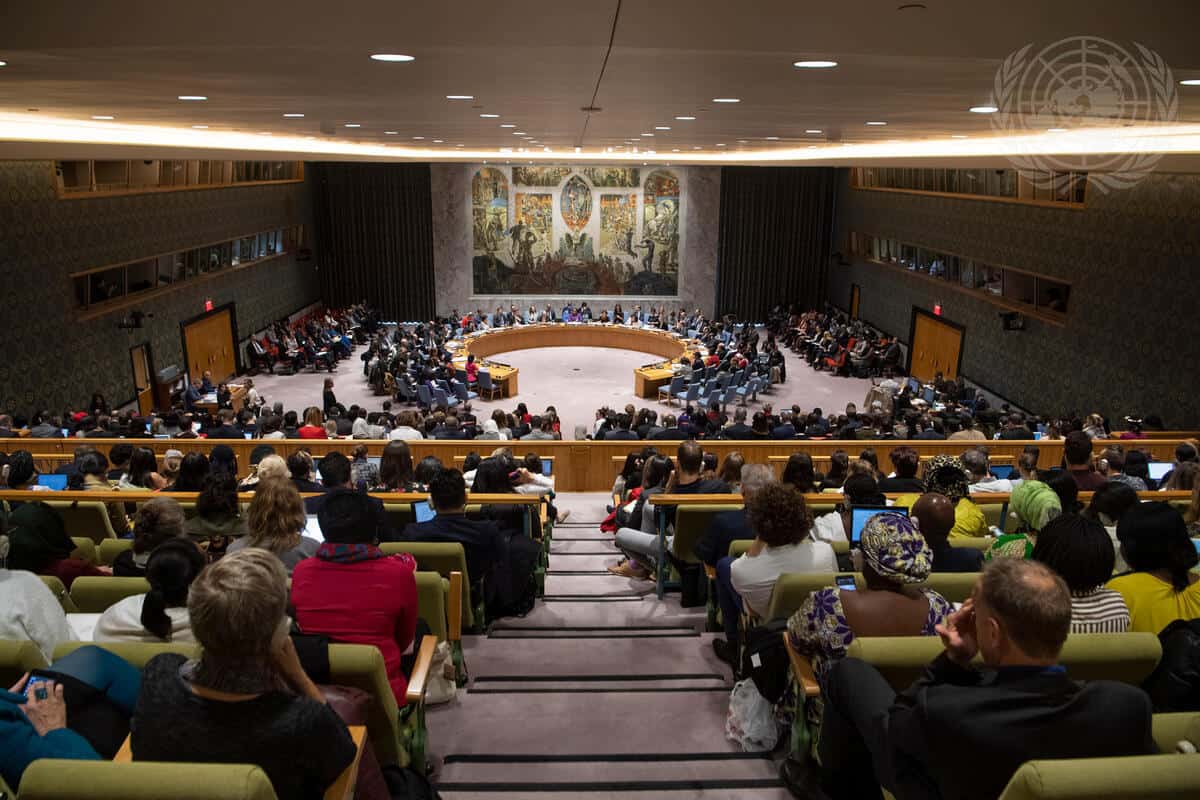Briefings by civil society are a regular, well-established practice[1] of the UN Security Council. In particular, the Council has specifically recognized the importance of briefings by women civil society or explicitly invited women civil society to brief the Council, in both country-specific and thematic discussions, in multiple resolutions on Women, Peace and Security (WPS), including Resolution 2122 (2013), Resolution 2242 (2015) and Resolution 2467 (2019). Through initiatives like the Shared Commitments on WPS,[2] Council members have expressed even greater support for women civil society’s participation at the Security Council.
The NGO Working Group on Women, Peace, and Security regularly tracks such briefings at the Security Council in order to promote diverse women civil society’s participation at the Council and ensure their independent perspectives and recommendations meaningfully inform the Security Council’s work. Below is a summary of briefings by women civil society[3] at the Council for the period January–April 2025.

- Between January–April 2025, 10 women civil society representatives were invited to brief the Security Council — a 37.5% decline compared to the same period last year.
- Their briefings took place at meetings on the situations in Afghanistan, Colombia, the Democratic Republic of the Congo (DRC), Haiti, the Middle East, including the Palestinian question, South Sudan, West Africa and the Sahel, and Yemen, as well as on the maintenance of international peace and security.
- Notably, in January, under Algeria’s presidency, the Council heard from the first Palestinian woman civil society representative since January 2022.
- Of the women civil society who briefed the Council during this period, 30% represented international NGOs or NGOs from the Global North, came from the Global North, or otherwise did not represent an affected community.
- During this period, the Security Council did not hear from any women civil society representatives from the following countries, though it held open meetings on these country situations: Central African Republic (CAR),[4] DRC, Libya, Sudan, Syria[5] and Ukraine.
__________
Photo: UN Photo/Eskinder Debebe
[1] The Security Council has long recognized the importance of civil society, which is referenced hundreds of times in Council decisions. In addition, the Council has specifically recognized the value of briefings by civil society or explicitly invited civil society to brief the Council in at least eight outcome documents spanning various thematic agendas, including Protection of Persons with Disabilities in Conflict (S/RES/2475 (2019)), Trafficking in Persons in Armed Conflicts (S/RES/2331 (2016)), Women, Peace and Security (S/RES/2122 (2013), S/RES/2242 (2015), S/RES/2467 (2019)), and Youth, Peace and Security (S/RES/2419 (2018), S/PRST/2019/15, S/RES/2535 (2020)).
[2] Through the WPS Shared Commitments initiative, started by Ireland, Kenya and Mexico in 2021, and expanded in 2022, 23 former and current Security Council members have committed to ensuring strong representation of diverse women civil society briefers in Security Council meetings. The 10 current Security Council members who have signed the WPS Shared Commitments are Denmark, France, Greece, Guyana, Panama, Republic of Korea, Sierra Leone, Slovenia, the United Kingdom and the United States.
[3] Under Rule 39 of the Security Council’s Provisional Rules of Procedure, the Security Council “may invite members of the Secretariat or other persons, whom it considers competent for the purpose, to supply it with information or to give other assistance in examining matters within its competence.” It is under this rule that civil society speakers are invited to brief the Council. The NGOWG’s count of women civil society briefers at the Security Council comprises only those briefers invited under Rule 39 who are explicitly members of women civil society—that is, who brief the Council in their capacity as an individual or on behalf of a local, national, regional or international non-governmental or nonprofit organization or network that is nonviolently promoting human rights, gender equality and/or peace, and contributing to positive social change for their communities. This includes women leaders, peacebuilders, human rights defenders, journalists, academics, experts or representatives of social movements advocating for or otherwise contributing to the promotion of human rights and peace. The NGOWG’s civil society briefer numbers do not include: individuals with clear links to a Member State or Member State-run entities; politicians or representatives of political entities; religious figures or leaders; celebrities; individuals who work in the private sector or business; individuals representing UN entities or regional or intergovernmental bodies; individuals who serve as Ambassadors, Champions or Envoys for Member States, UN entities or regional or intergovernmental bodies. Individuals that do not meet the definition above may be invited to brief the Security Council under Rule 39 but are not necessarily considered independent and genuine civil society representatives.
[4] In February, under China’s presidency, the Security Council heard from a woman briefer from CAR, who represented the private sector. See: S/PV.9864.
[5] In March, under Denmark’s presidency, the Security Council heard from a woman briefer from Syria, who represented a political entity. See: S/PV.9885.
